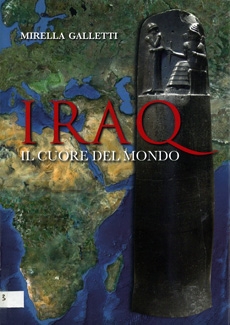
Iraq, il cuore del mondo
The Heart of the World
Mirella Galletti
Lamberti
Iraq is one of thè key countries of thè Near and Middle East: for its centrai position, thè size of its population (30 million), thè water resources of its two rivers, thè Tigris and thè Euphrates, its oil reserves place it second in thè world, and its important bureaucratic apparatus. Iraq is thè only Arab state to have a large population, and extensive oil and water resources.
The first civilization in thè Near East was born in ancient Mesopotamia. The Sumerians were well established by 4500 B.C. and invented thè first cuneiform writing towards thè end of thè fourth millennium. Sargon of Akkad founded thè world’s first multiethnic empire including Mesopotamia and thè Near East in thè 23rd century. Assyria then ruled thè Near East as far as Egypt from thè ninth to thè seventh century B.C. Alexander thè Great occupied Mesopotamia (334-327 B.C.) which, after thè brief Hellenistic period, was governed by thè Parthians.
The Romans and thè Parthians fought for thè conquest of thè region which, despite Hadrian’s and Septimius Severus’s campaigns, remained largely alien to thè Roman conquest and was then incorporated into thè Sasanid Empire.
The swift seventh century Arab conquest was made easier by an earlier infiltration of nomadic peoples from thè southern ...
Mirella Galletti teaches «I listen of Islamic Countries» at the Faculty of Political Studies of the Second University of Naples.
She studied Political Science at the University of Bologna with a thesis on «Political structure and cultural values in the Kurdish society» (1974). She completed her studies in Baghdad. Cairo and Algiers.
She has taught courses at the Universities of Naples “L’Orientale”. Milan Bicocca, Ca‘Foscari in Venice. Bologna and Trieste. She has held seminars at the Universities of Lrbil and Sulaimaniya in the Region of Kurdistan (1994). Author of 20 books and over 150 studies translated into many languages. Also by the author:
- I curdi nella storia, Chicti, Vecchio Faggio, 1990.
- I.e relazioni ira Italia e Kurdistan. Roma, Istituto per l’Oriente C.A. Nallino. 2001.
- Storia della Siria contemporanea. Popoli, istituzioni e cultura, Milano, Bompiani, 2006.
- Kurt Yemek Kiilturu. Istanbul, Avesta. 2010. Le Kurdistan et ses chrétiens, Paris, Les Éditions du Cerf, 2010.
- «Curdi e Kurdistan in opere italiane del XIII-XIX secolo», Oriente Moderno, LVIII, 1978: (Arabie translation) «at-turath al-kurdi tì mu’allafat al-italiyyin». Majallat al-majma ' al-‘Unti al-'iràqì - al-hay'at al-kutdiyyah (Journal of the Iraqi Scientific Academy-Kurdish section), Baghdad, 1981.
-«Le fonti diplomatiche italiane sull'Iraq 1922-1950», Italia contemporanea, No. 212, 1998.
| 